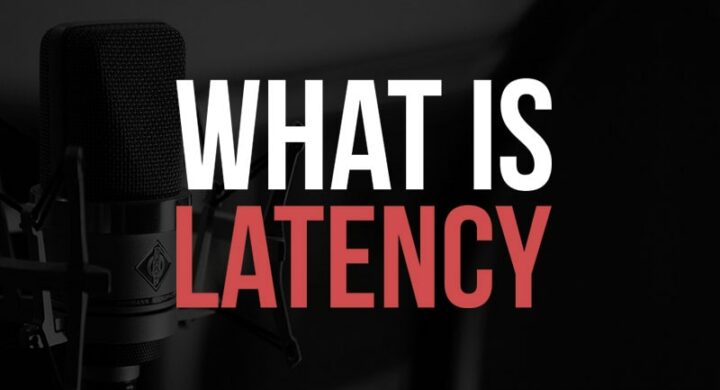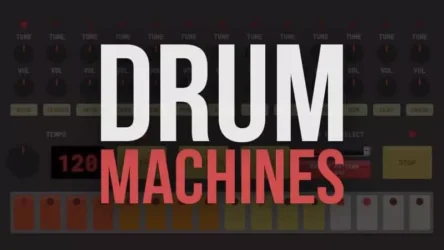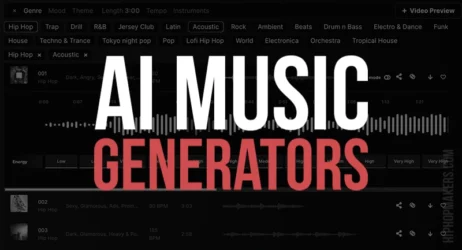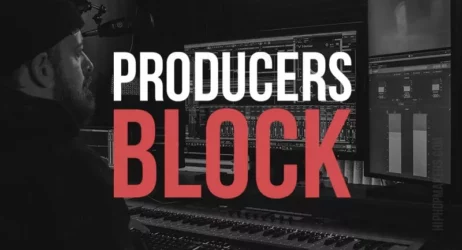In this guide we will answer what is audio latency, what causes latency issues, how to troubleshoot, and how to reduce audio latency problems.
- What Is Audio Latency
- Common Causes Of Latency In Audio
- How To Reduce Audio Latency
- How To Troubleshoot Audio Latency
- How To Fix Audio Latency In Fl Studio
- How To Fix Audio Latency In Ableton Live
- Does Latency Affect Sound Quality
- What Is A Good Latency For Audio
What Is Audio Latency?
Audio Latency refers to the time it takes for audio to go through your device to the listener’s ears. Latency causes an audio delay that takes a couple of milliseconds to hear. Latency can become a problem when recording vocals or playing a MIDI device because audio isn’t played back in real time.
Audio latency is a problem most music recording artists face. Latency is a word that is normally used in live streaming and video games, but it can also affect music and other sound recordings.
Audio latency is measured in milliseconds and can make or break your music performance. It is specifically a problem for musicians who rely on the precise timing of their audio signal.
Latency is most unfortunate and can bother people. It’s that echo that people hear when talking via radio, on the telephone, on Skype, on radio transmissions, on mics, or on some headsets.

In music recording, audio latency is an issue that can cause things to go wrong. Producers and engineers use tools like Logic Pro and Pro Tools to compensate for the latency when they are routing audio.
In live audio, latency can be a real problem if you are trying to perform next to a drummer because digital audio and video devices delay the sound, which ruins the synchronization of the performance.
Audio Problems Caused By Latency
Audio problems caused by latency mostly affect the music industry. Why? Because most musicians play and record using digital audio equipment, which has a higher chance of suffering from latency issues.
In some cases, musicians have to completely re-record their songs because they have played a song with some slight latency. They have to record their songs and re-record them, which costs a lot of money and time.
Though latency is more noticeable in recordings, latency also affects live performances. When the band is playing next to the drummer, they need to play with perfect timing or sound like one big echo.
Latency can cause other problems too. If you are trying to monitor your performance while playing an instrument, latency can cause many problems. If you use an electronic drum kit, latency can make the sounds come in too late and ruin your performance.
However, latency is not always bad. If you are recording, you can record your instruments one at a time and then put them all together in the editing process.
Most musicians do not experience latency problems because they can recognize them and adjust accordingly.
What Are The Common Causes Of Latency In Audio?
Latency can be caused by factors like the device you are recording, the software you are using, your computer’s processor or capabilities, your peripherals, or an external device.
Your computer’s processor can affect latency, so if you are recording to your computer, the best thing that you can do is upgrade your processor. Your computer’s RAM also affects compatibility and performance, which is why it’s important to make sure that you have enough.
There can also be latency issues stemming from the software you use to record and your peripherals such as speakers, headphones, and microphones. Your software and peripherals need to be compatible with your computer, or they can contribute to latency issues.
There are technical problems such as faulty cables, broken drivers, and incompatible software that can cause latency issues. Sometimes it is just the basic hardware of your computer that doesn’t give you many options to reduce latency.
How To Reduce Audio Latency?
Latency can be reduced by reducing the buffer size, using different equipment, and downloading drivers. The latency problems you experience might be solved by simply adjusting the buffer size.
The problems you experience with audio latency can be fixed by downloading audio drivers and making sure your software is compatible with your computer.
As we mentioned before, upgrading your processor and RAM is the best way to reduce latency and the problems that come along with it.
The best way to reduce latency is by fixing the technical problems causing your machine to slow down. Make sure you use good cables with no faults, have updated drivers, and use compatible software.
You can also solve latency issues by reducing the buffer size on your equipment. A reduced buffer size means that there will be less audio data to process, which reduces latency.
There are several tools you can use to help fix your latency problems. Some of these tools include:
ASIO4ALL
This works to improve your system’s audio performance by configuring your Windows sound settings. It is compatible with most brands of sound cards.
ASIO Latency Fixer
This is another good tool that reduces latency with most brands of sound cards. It works by allowing your software to communicate more directly with the sound card, which means less latency.
WaveRT
This works to emulate a real-time audio system for Windows 7 and Vista. WaveRT makes it possible for applications to have real-time privileges, which reduces latency.
WASAPI Event Style
This is another method that can fix your latency issues by configuring your Windows sound settings. It works to provide a low-latency audio experience that is compatible with the audio engine of Windows Vista.
How To Troubleshoot Audio Latency?
Troubleshooting audio latency can be simple. If you are experiencing issues, try these steps first:
Ensure that your computer is fast enough to record audio. The computer needs to be able to process the incoming data quickly in order for it to keep up with what is being input into the software.
Ensure that the driver for your audio interface is up to date. The device may be incompatible with your computer or operating system.
Latency can also be affected by your settings. For example, if you monitor latency delay through a DAW (Digital Audio Workstation), make sure to use the lowest possible bit depth and sample rate. Otherwise, it will add latency to the DAW output.
If you hear an audible delay when you are monitoring, use the input delay function of your audio interface to compensate for this.
If all else fails, use an audio splitter to combine the input into two separate paths, one for monitoring latency delay and the other without.
Related: What Is An Audio Interface
How To Fix Audio Latency In Fl Studio?
If you’re experiencing latency in FL Studio, there are a few steps you can take to reduce any problems you may be having.
1) First, make sure that your ASIO Drivers and FL Studio MIDI settings are correct. Ensure your audio device is selected in the ASIO driver list and your MIDI settings are configured to match how you have them set up in FL Studio.
2) Next, check the ASIO driver buffer size. If it’s too low, the audio from FL Studio won’t be able to keep up with your computer.
If you have an older computer, you may need to change your audio buffer size. This is done by opening FL Studio’s Options window and going to the Audio Settings tab.
How To Fix Audio Latency In Ableton Live?
You can fix audio latency in Ableton by applying the following settings in the audio setting menu.
1) Reducing the buffer size is the first step to reducing audio latency. Make sure to set the buffer size to the lowest possible without audio dropouts.
2) Raising the sample rate will help reduce the latency as well. Make sure you’re using a sample rate that supports your audio interface.
3) Another solution is disabling the audio input device in your audio preferences. This forces Ableton to use the default audio input so you can hear yourself when recording.
4) ASIO drivers are low-latency drivers that allow your computer to communicate with the audio interface. Make sure you have ASIO drivers installed on your system.
Does Latency Affect Sound Quality?
Yes, for professional recording artists and musicians. While the effects of latency on sound quality are subtle, they affect music production enough to be frustrating to music recording artists and musicians.
Latency can also cause problems when playing live music, as it delays sound from when a musician plays an instrument until they actually hear the sound. This can cause missed beats, bad transitions between songs, and sloppy playing.
What Is A Good Latency For Audio?
Most audiophiles agree that a good sampling rate for audio is 44.1 kHz and that a minimum latency should be 10 ms. However, some musicians can find latencies up to 25 ms acceptable to work with.
Although latencies up to 25 ms are sometimes acceptable, gaming, music teaching, and other fields can suffer from audio latency due to the time span of the note being played.
High latency can also cause problems when using headphones with a large tolerance for latency. When the buffer size increases, it will gradually become more difficult to use headsets with high latency.
Summary of Audio Latency
Audio latency refers to the time delay between the audio input and output of an audio signal. It’s an essential element in digital signal processing that impacts music production. Understanding it is crucial because it can affect the audio quality of your music production.
Latency occurs as the audio engine needs time to process audio signals. When a signal, whether it’s an input signal from a musical instrument or a virtual instrument on your computer, is sent to the audio interface, it undergoes signal processing.
In this process, the digital signal is transformed into an analog signal, and vice versa.This conversion and the subsequent processing require time, leading to latency time.
The latency can be broken down into input latency, the delay from when an audio signal enters a system, and output latency, the delay when it exits.
The sum of these two is known as round-trip latency. Audible latency, which is latency noticeable to the human ear, typically starts around 10-20 milliseconds. However, even lower latency can cause issues in music production, especially when recording or playing live.
There are several ways to measure latency. One common method is to use the audio drivers or software that come with most audio interfaces.
They usually have a control panel where you can see the input latency, output latency, and sometimes even the round trip latency.
To minimize latency, there are several strategies you can use. One way is to optimize your audio driver and audio interface settings. You can usually adjust the sample rate and buffer size in the control panel of the audio interface drivers.
A smaller buffer size can lead to lower latency but may increase the CPU load, as the computer needs more processing power to process audio data more frequently.
On the other hand, a higher sample rate can improve audio quality but also increase data buffer and, thus, latency. Balancing these settings provides more control over the latency time.
Another tip is to use zero-latency monitoring, if your audio interface supports it.
Zero latency monitoring allows you to hear the input channel directly, eliminating the time difference caused by latency. However, it’s important to remember that zero latency monitoring only affects what you hear, not the recording latency.
You may encounter more latency when working with multiple instances of plug-ins or virtual instruments.
Each additional instance requires more processing power, increasing the delay time. To minimize this, try to use fewer instances or freeze and bounce tracks to reduce CPU load.
Reducing latency is a vital part of ensuring high audio quality in music production. You’ll have a smoother and more efficient production process by understanding how to control and minimize latency. Always remember, in the world of audio processing, every millisecond counts.
I hope you understand what audio latency is and how to avoid audio delay problems when recording audio.




